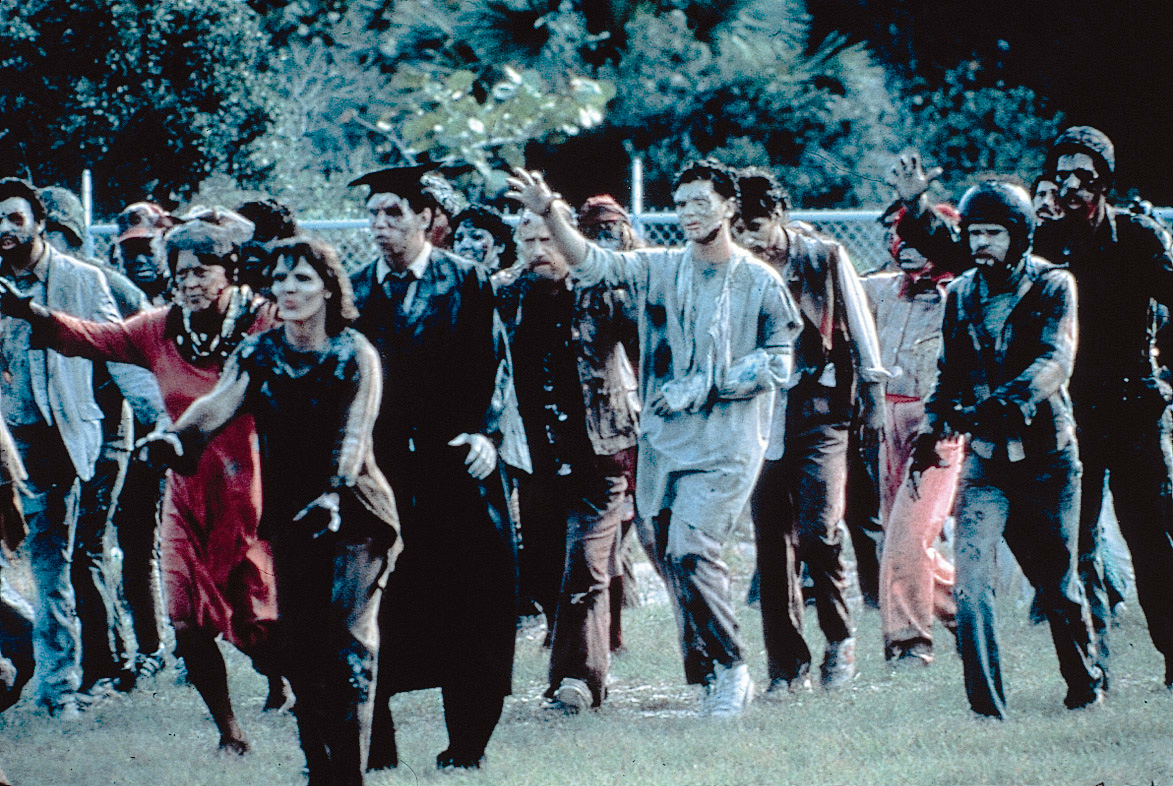Sitting at a piano, decked out in Ray Bans and a black suit, Nicolas Cage sings his heart out about “Pachinko”. A sort of cross between a slot machine and pinball, Pachinko is, like your favorite late seventies rock band, big in Japan, indeed it is part of the fabric of modern Japanese capitalism. Gambling is illegal in Japan, yet Pachinko is tolerated. Instead of winning money at Pachinko parlours, players are awarded golden tickets which are thus exchangeable for cash at other locations affiliated with the parlours themselves. The industry, targeting poor and working-class people not unlike video terminal gambling in North America, is primarily staffed by ex-police.
Read moreRiots and Reality: Sorry to Bother You and Radical Irrealism
Image by Craig E. Ross.
Capitalism is an irrational system which refuses to see itself for what it is. Like an obnoxious trust fund kid slumming it at a dive bar, it cannot help but loudly declare how ingenious and deserving it is. Accepting its arguments for how things are and how they change is to accept the argument that there is some method underneath the layers of madness, that its opulence can somehow be separated from its exploitation, that it has something other than an ever-deepening inhumanity in its future. While our dreams are deemed irrational, capitalism’s degradations are justified as science.
To grasp the significance of Sorry to Bother You is, on some level, to grasp this truth about capitalism. Boots Riley has written and directed a film that is being celebrated by the far-left and mainstream critics alike. Those familiar with Riley’s musical and lyrical work with the Coup know that he is adept at combining his unabashed revolutionary politics with a skewed, cartoon-like worldview.
Read moreAfter Left Melancholia: A Winding Walk Though the Wreckage
The ruined Buzludzha.
In Nikolaus Geyrhalter’s Homo Sapiens (2016) the first and last shots of the film are of the Buzludzha monument in Bulgaria – constructed by the Communist state to commemorate the secret formation of its forerunner, Bulgarian Social Democratic Party, in 1891. After the collapse of the Eastern Bloc in 1989, it was abandoned. Today its vast chambers, statues and mosaics are crumbling.
Geyrhalter’s 90 minute film is composed entirely of stationary shots of human-made buildings that have been abandoned to the elements. Shopping centers in Fukushima, abandoned theatres in Detroit, nondescript hospitals, office buildings, shoreline amusements parks flooded by the tides.
Read moreAmericanism as 20th Century Communism
Lev Kuleshov’s The Extraordinary Adventures of Mr. West in the Land of the Bolsheviks (1924).
Artists, radicals and radical artists have always looked at the future, the horizon, and seen a telos of emancipation. From modern-day left-accelerationism to 90s anarcho-cybernetic to prog-rock’s discovery of the synthesizer, the future has been an emancipatory muse. Owen Hatherley’s Chaplin Machine engages what could be termed an early example of left-accelerationism: the Soviet avant-garde’s absolute fascination with America. Indeed, going with Hatherley’s beautifully written and sometimes cheeky account with this fascination that, to be frank, sometimes borders on mystification, one can even reverse the aphorism of Earl Browder, the old social-patriotic leader of the American Communist Party, “Communism is 20th century Americanism.” This is to say that to those in the early Soviet avant-garde, and indeed cultural producers in general, Americanism was 20th century communism.
Read moreOctober: Ten Days That Shook the World
There are different methods of celebrating an anniversary. There is that which looks back with pure nostalgia; a soft, uncritical reification that half expects time to repeat itself. It is safe to say that the vast majority of anniversaries are celebrated in such a way.
Then there is the method of commemoration that looks forward, that intrinsically understands history as a constant process, unfolding in this way or that depending on who pushes, who is pushed, and whether they are willing to push back. Not events as blueprints, but as ruptures and openings though which we can see a different future.
Read moreBeyond Heaven and Hell, This World is All We've Got: Blade Runner 2049 in Perspective
Denis Villeneuve’s Blade Runner 2049 is the much-anticipated sequel to the 1982 cult film directed by Ridley Scott. Like the original, 2049 is a visually stunning depiction of our potential dystopian future; one that if we read it in its historical context provides for us a detailed cognitive mapping of the continued decline of unfettered multinational capitalism. Also, like the original, the new film provides a surface level portrayal of the world that, if read in spatial terms, maps for us many of the contours of the rhizomatic networks of contemporary capital...
Read more"Quite an Experience..." Blade Runner, Marxism, and Postmodernity
Joe Sabatini and Jordy Cummings of Red Wedge spoke with the Winnipeg-based cultural theorist Matthew Flisfeder and had an exchange on Flisfeder’s recent book, Postmodern Theory and Blade Runner, excerpted earlier this month on this site. Flisfeder’s insights transcend the analysis of a single film, rather he offers us new tools with which to engage the popular avant-garde, as well as how we can periodize modernity and postmodernity. A wide-ranging thinker and supple theorist, Red Wedge encourages our readers to seek out his exemplary cultural analysis. We look forward to what comes next from Dr. Flisfeder.
Read moreFuture Imperfect; or, "It's Easier to Imagine the End of the World..."
Red Wedge is delighted to share an excerpt from Matthew Flisfeder’s book Postmodern Theory and Blade Runner (2017). The book is part of the Bloomsbury series Film Theory in Practice, edited by Todd McGowan. This excerpt comes from the end of the second chapter.
With a sequel coming up later this year, the time to revalue Blade Runner as a profoundly historical film has come. The film was made during a critical transition point within the history of capitalism.
Read moreKnight of the Living Dead
George A. Romero is dead. And much as some of us would like it, the director of the most iconic zombie horror films of late capitalism will not be rising from the grave to walk among us. But the ravenous consumption that we see in his creations – of flesh, of our sanity, of our hope for the future – will continue. Unless it is brought to its knees then late capitalism has all but assured this.
The interview below with author and film studies professor Tony Williams – one of the very first articles to appear at Red Wedge – was conducted by editor Adam Turl and appeared on the site in October, 2012.
Read moreGet Out From Where?
Daniel Kaluuya (Chris Washington) in Jordan Peele's Get Out
Masterful cinema usually leaves little to accident. With the film world completely oversaturated by works that are intellectually lazy and yet somehow overwrought with production costs, this is easy to forget. Many would say that the age of the auteur is behind us. It’s overly glib, but also understandable.
Throw in a film that cuts against this, where everything is well-placed and intentionally so, and a film-going public hungry for something that hits the sweet-spot between smart and emotionally satisfying will not be able to stop talking about it. Enter, like an unexpected guest who has been hiding in your basement, Get Out.
Read moreWe Don't Want To Be Emperors...
The very idea of “President’s Day” has always been a farce. But in the age of Trump the idea of celebrating the American presidency’s unchecked power just feel bitterly ironic. Red Wedge isn’t the only one feeling this irony; today, in several cities, “Not My President’s Day” rallies are taking place.
When our editorial board adapted the text below and designed its accompanying image, it was intended as a reward for our fall fundraising drive (which we are in the process of mailing out as we write this). It is now available exclusively to anyone who joins the Red Wedge Patron program at ten dollars or more each month.
Read moreVictory to Striking Cinema Workers
Recently, one of Red Wedge's editors had the chance while in London to stop by the picket line at the Ritzy Cinema in Brixton. It was perhaps one of the more spirited and creative picket lines that he's attended in quite some time, particularly considering the bitter cold and the utter intransigence of management.
The Ritzy is part of the Picturehouse chain of cinemas in Britain, which presents itself as somewhat art-house but unpretentious (the Ritzy, for example, is currently showing Jim Jarmusch's latest film Paterson as well as Office Christmas Party).
Read more
The Faux-Wokeness of Film Reviews: In Defense of The Free State of Jones
What’s the best thing about Gary Ross’s The Free State of Jones? It is clearly a film that will rile the “All Lives Matter” crowd. For conscious white-supremacists and “color blind” racists alike, the portrayal on screen of a white Southerner – an army deserter – in league with runaway slaves in defiance of the tax man, the war machine, and the system of human bondage, amounts to a giant slap in the face. And it should be. But The Free State of Jones is much more than that. Here we have a mainstream film about a band of rebels in conscious opposition to economic inequality and horrendous racial injustices. What's more, they are led by a proponent of a utopian, agrarian-socialist vision of society.
Read moreDiamond Reynolds' Chorus
Diamond Reynolds (center), who live-streamed the death of her fiance Philando Castile at the hands of police on her phone.
This text begins with facts, they will not be argued here. We live in a police state founded on white supremacy. Philando Castile has been murdered along with thousands of others for being black. For white supremacy blackness is both a necessary other and its greatest threat.
Any analysis of what Diamond Reynolds did when she livestreamed the aftermath of Philando Castile’s murder will be incomplete and totally insufficient to meet the demands of her call for justice. “Truth makes a hole in knowledge.”
Read moreSupport Consumer Grade Film
Still from Consumer Grade Film's In Circles demo reel.
Consumer Grade Film is producing a feature-length movie, In Circles, and they need your help. As they write on their website:
Consumer Grade Film is a U.S. Midwestern collective of filmmakers focusing on low-budget, socially-conscious projects. Our current works in progress include the short, Ubercreep, the feature length film, In Circles, and the YouTube channel, VHS Girl. We are open to collaboration with other filmmakers focusing on similar content.
Read moreLong Live Satie!
There are a great many fun and entertaining ways one could celebrate the 150th birthday of Erik Satie. The Velvet Gentleman seems to cast such an omniscient shadow over modern music that he is almost invisible. This of course isn’t the only paradox he represented. Though Satie was indeed a unique eccentric who sought to explode musical convention, his philosophies resonate in even those most traditional, straight-laced and boring of today’s composers. In fact it is not far-fetched to say that his music is so universal in western composition that we often don’t even consciously identify it as his. Satie’s iconic Gymnopedie No. 1 was, after all, and in very stark contrast to his unorthodox predilections, used as a background lullaby in a BMW commercial.
Read moreThe Cultural Economy of Star Wars
Star Wars stands out as perhaps the most popular franchise in the history of science fiction and fantasy. George Lucas' original trilogy did what even Stanley Kubrick's 2001 failed to accomplish: it made Hollywood executives look to speculative fiction as a genre worthy of investment and promotion.
One can easily date the origin of Hollywood's current reliance on the genre for the profitability of the industry itself to the original film. With the rebirth of the franchise at the hands of director J.J. Abrams the cycle has come full circle. Abrams’ The Force Awakens is a direct homage to the original film, boasting an almost identical narrative structure keeping with the saga's “rhyming” tendency.
Read moreAgainst the Weak Avant-Garde
Robert Rauchenberg's White Paintings
We have reached the Hegelian endgame; the fusion of art and philosophy. Not quite, as Arthur Danto notes, a negation of art by philosophy but the fusion of both. The art object has become, it is claimed, a philosophical argument in itself. But it is a pyrrhic victory – a Twilight Zone ending for art history, modernism and the avant-garde.
Anything can be made into art. But there is a small army of theorists dedicated to parsing out what is and isn’t art. Anyone can be an artist – if they aren’t too attached to the idea of eating dinner. Art and philosophy have fused but in the absence of the social revolution that was meant to accompany that fusion. The result is a philosophical-art object that is profoundly weak. If the present model of serious contemporary art is a weak avant-garde, the solution is a popular avant-garde: a rapprochement between artistic experimentation (as art) and mass emancipatory politics.
Read moreJohnny Got His Gun
The success of the film Trumbo – starring Bryan Cranston as the titular blacklisted screenwriter and Communist Party member – has come at an interesting time in the American cultural landscape. Discussion of socialism is now commonplace. As is free and open discussion of stripping people of their civil rights because of what their beliefs may or may not be. As a gauge of how important it might be, the film has gladly pissed off the right people.
Filmmaking is a fickle art-form; it is of course impossible to cram every single element of a person’s life into a biopic. Nonetheless, that the film doesn’t mention in any way Dalton Trumbo’s masterpiece novel Johnny Got His Gun is frustrating for those familiar with his work. Telling the story of a young soldier fighting in World War I who, caught in an explosion, loses both arms and both legs as well as his sight, hearing and...
Read moreNeoliberalism and the Radical Imagination
In late May 2015 Red Wedge editors Alexander Billet and Adam Turl spoke at the Left Forum in a workshop on "Neoliberalism and the Importance of the Radical Imagination." The above audio includes the presentations by Billet and Turl as well as the discussion that followed — touching on how neoliberalism has narrowed the radical imagination, the relationship of labor to culture, as well as possible practical and aesthetic strategies for contemporary art and culture.
Read more













